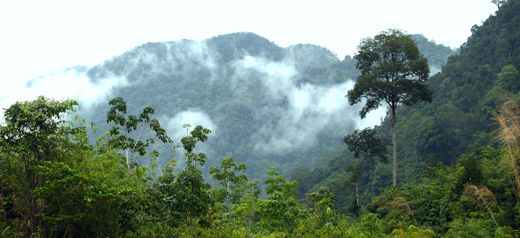
Large animals play a key role in mitigating climate change in tropical forests by spreading the seeds of large trees that have a high capacity to store carbon, new research has found.
The research, co-led by the University of Leeds and published in the journal Nature Communications, sheds important new light on the role seed dispersal by animals plays in mitigating climate change, and how this role can vary in tropical forests across the world.
In tropical forests of the Americas, Africa and South Asia, a large majority of tree species depend on animals for seed dispersal. Tree species with large seeds attain greater adult sizes than those with smaller seeds. Using simulations, the researchers showed that declines of large animals will result in forests having fewer large trees – and hence carbon losses from these forests over time – as they play an important role in seed dispersal.
In contrast, a relatively large proportion of large-statured tree species in tropical forests of South East Asia depend on wind and gravity rather than animals for seed dispersal. In these forests, the loss of animal dispersers will not have as pronounced an effect on carbon storage.
Experts from 15 institutions, including the Faculty of Biological Sciences at the University of Leeds, together with colleagues from the National Centre for Biological Sciences in Bangalore, India, examined how tree species dispersed by large animals differed from tree species dispersed by smaller animals and by other methods, for example wind and gravity, in their ability to store carbon.
Dr Mahesh Sankaran, of the School of Biology at Leeds, was part of the team that led the study. He said:
“There is growing recognition that the loss of animals from ecological communities, known as defaunation, poses a threat to carbon storage in tropical forests, but much of this understanding is derived from patterns seen in South American forests alone.
“Our work shows that carbon storage responses to defaunation will vary across the tropics, largely as a result of differences in the evolutionary histories of forests on different continents.”
Dr Anand Osuri, post-doctoral researcher at the National Centre for Biological Sciences and lead author, said:
“Our study shows that, on the pan-tropical scale, consistent relationships between species' seed dispersal strategies and adult size are likely to be one of the main factors driving shifts in carbon storage potential in response to defaunation.”
Carbon stored in terrestrial ecosystems, such as forests, reduces the amount of carbon that would otherwise accumulate in the atmosphere in the form of carbon dioxide and contribute to climate change.
Tropical forests are among the largest terrestrial reservoirs of carbon, but for them to be most effective at mitigating climate change, policies must focus not just on saving the forests themselves, but also protecting large seed dispersing animals that inhabit them.
Further information
The research paper, “Contrasting effects of defaunation on aboveground carbon storage across the global tropics”, by Osuri et al, is available from the University of Leeds press office.
For more information contact Ben Jones on 0113 343 8059 or email B.P.Jones@leeds.ac.uk